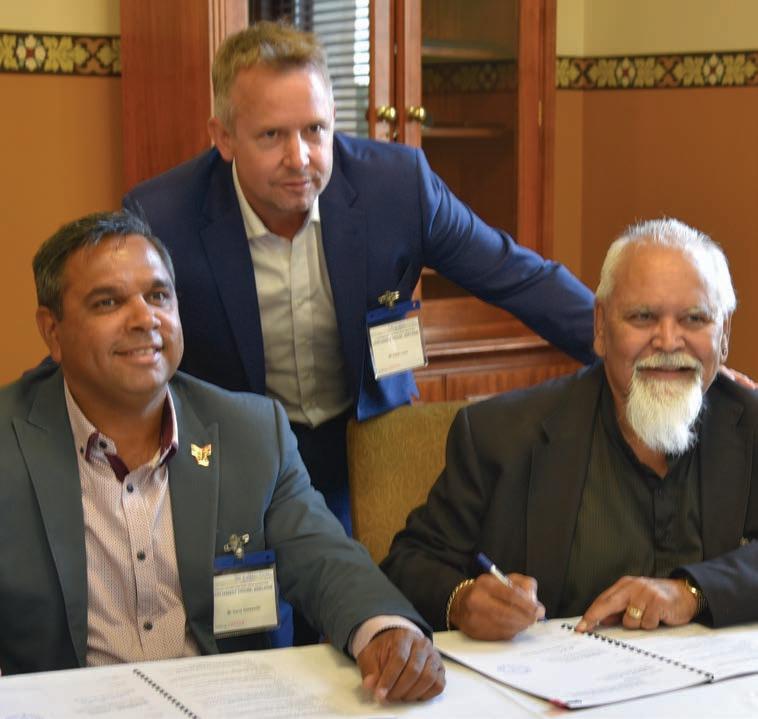
8 minute read
SA Government signs Buthera agreement
SA Government signs Buthera agreement with Narungga Nation
In the final days in power, the ALP South Australian Government signed a formal agreement with an Aboriginal nation which they said was the first significant step in establishing a state based treaty. Representatives of the Narungga Nation, who are the First Peoples of the Yorke Peninsula and the then SA Minister for Aboriginal Affairs Kyam Maher, signed the Buthera Agreement in SA Parliament on Friday 16 February.
Advertisement
The agreement committed both parties to negotiate for treaty over the next three years and included a commitment from the government to provide support to Narungga in economic and community development work.
It was the culmination of a year-long process which began with Treaty Commissioner, Dr Roger Thomas seeking the views of Aboriginal South Australians, before the government entered into discussions with three Aboriginal nations on treaty. Garry Goldsmith, Chair of the Narungga Nation Aboriginal Corporation (NNAC) told the crowd assembled at Parliament House in Adelaide that the Buthera Agreement was more than a simple agreement. He said that it was symbolic and of significance not just to Narungga, but also to the state of South Australia, Aboriginal nations in general and to nonAboriginal Australians. “It sets the parameters for an equal and equitable relationship, to work towards positive change for our people”
“It acknowledges our ownership and rich relationship with our country, our language to be revived our songs and dance to be enjoyed and to increase our longevity and to have a better quality of life for current and future generations” Mr Goldsmith said.
Minister Maher said that “the signing of this historic agreement is first and significant step towards treaty in this state”. “It’s a combination of the South Australian Government’s work with the Narungga nation and a reflection of our commitment to Aboriginal governance and leadership in this state. We can and should all be extraordinarily proud of this milestone in this process in this state” he said.
Minister Maher explained why treaty had been so strongly on his government’s agenda.
“Treaty remains the most important unfinished business in Australia today. Australia is the only nation of those we compare ourselves to without a treaty with the first peoples of the land. It was not a peaceful settlement 230 years ago, it was not even close to fair or just.” he said.
“As a nation we can not properly stand up while we refuse to acknowledge and recognise our past.
“Until you take steps to right the wrongs of what happened, only then can you work to a more positive future.
“Treaty is an important next step. Treaty could go a long way towards helping Aboriginal people get on an equal footing.”
Minister Maher noted in his speech that a state based treaty process did not remove the need for treaty at a national level.
“A state government treaty can not address all the consequences of European settlement and its legacy of injustice. A Federal treaty process is I think inevitably necessary, as a crucial next step in our journey as a nation” he said.
The Narungga nation were represented in the negotiations with the SA Government by Anthony McAvoy SC, along with SA Native Title Services (SANTS) Lawyers Andrew Beckworth, Olivia Brownsey and Osker Linde. Support for the community meetings was provided by SANTS administrative and legal support staff. Mr Linde congratulated Narungga people on making the most of the opportunities that were presented by the talks with the Government.
“The Agreement provides some muchneeded resources to develop NNACs capacity to fully realise the benefits of the agreement, including the establishment of fishing and aquaculture businesses and co management agreements on national parks within their territories” he said.
“It’s notable that the Government was willing to commit to working with Narungga towards legislative change that could see them realise a treaty in what will hopefully be the near future” he said.
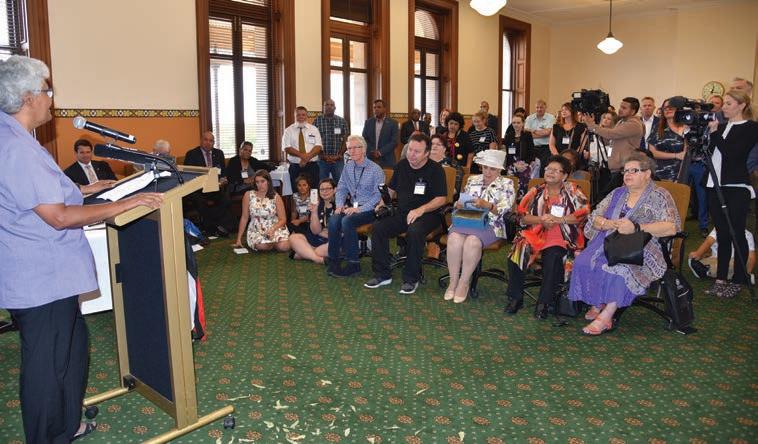
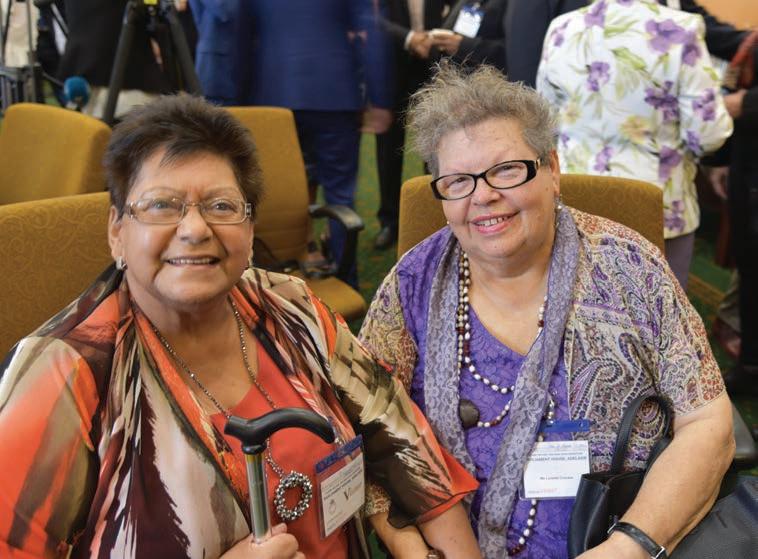
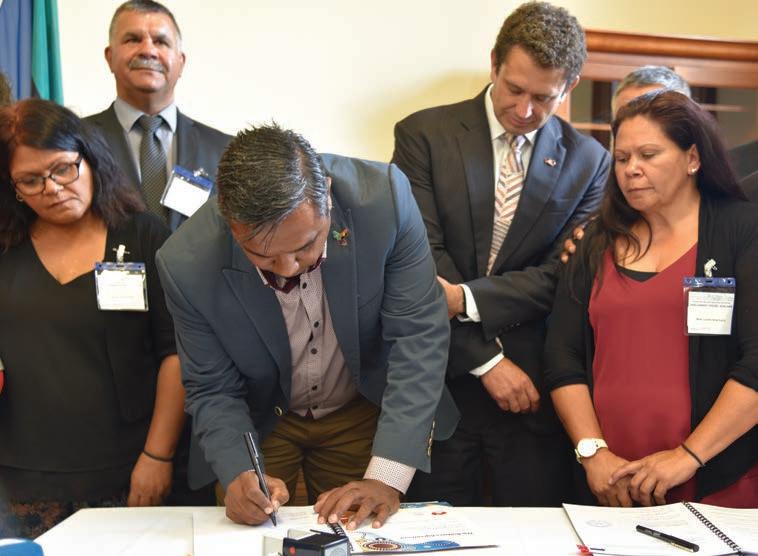
This page, left to right, from top right: Garry Goldsmith, Osker Linde and Tauto Sansbury at Buthera signing; Nerida Saunders addresses audience present at Parliament House for Buthera signing; Shirley Peisley and Lynette Croker; Ann Newchurch, Dough Milera, Garry Goldsmith, Kyam Maher and Lynette Newchurch. Opposite page, top to bottom: Farren Wanganeen, Christinke Stockey, Osker Linde, Rex Angie, Edward Newchurch, Peter Buckskin, Ann Newchurch, Patrick Dodson, John Buckskin, Ian Haseldine, Dough Milera, Kaylene O’Loughlin, Kyam Maher, Lynette Newchurch, Garry Goldsmith, Tauto Sansbury, Jeffrey Newchurch, Naomi Hicks, Tony McAvoy and Roger Thomas; Garry Goldsmith, Kyam Maher, Tauto Sansbury and Peter Goldsmith.
On 18 January, three Narungga women won an extension of time in the Supreme Court for people to consider the next step in treaty negotiations with the State Government. The agreement was then accepted by the community at a meeting on 3 February.
The signing came the day before the SA Government goes into caretaker mode, the period in which the government must avoid making major decisions that would limit the freedom of action of an incoming government.
The then Opposition Leader, now Premier, Steven Marshall has previously said that plans for treaty are unworkable and not a priority for Aboriginal communities in South Australia.
Mr Goldsmith explained that the name of the Buthera Agreement has cultural significance to Narungga people. “The Buthera Agreement represents our Narungga dreaming, the foundation of our creation. Dreaming of Buthera, a giant man demonstrating his strength, resilience and passion towards his people. This emanates into who we are today as Narungga descendants, and a nation rich in passion, pride, culture and traditions” he said.
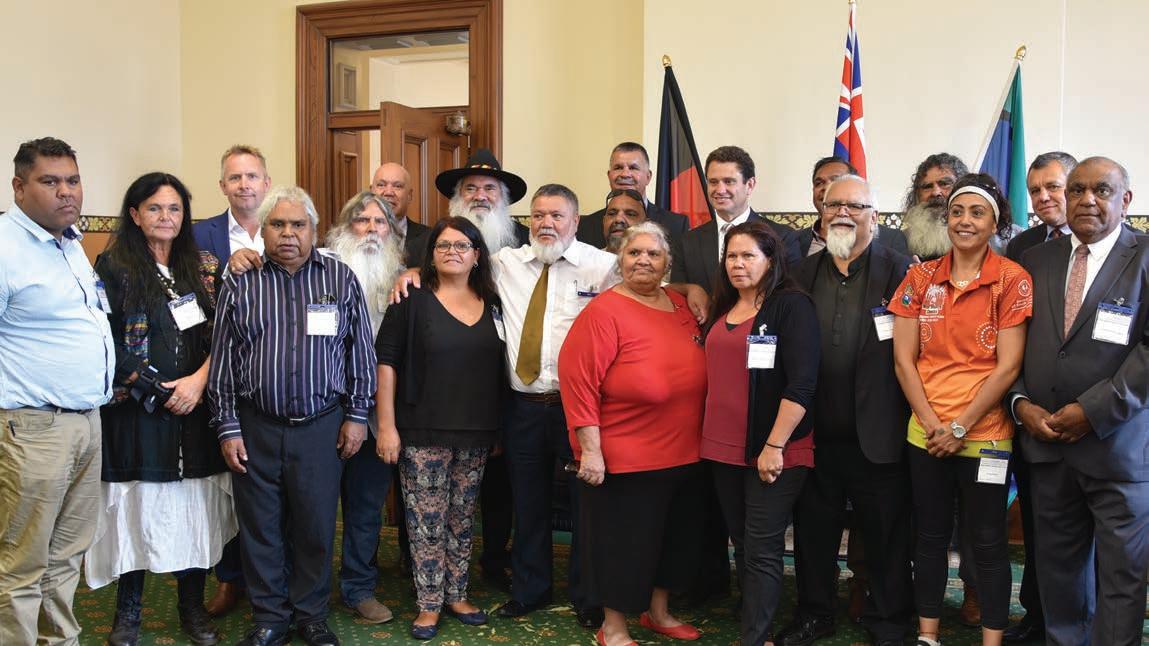
Mr Goldsmith noted that the signing ceremony marked the beginning of an important new process. “One man said to me today ‘the hard work starts now’” he said.
“So let ’s make sure from here on in and what we do to commemorate Buthera we too can stand tall” Mr Goldsmith said.
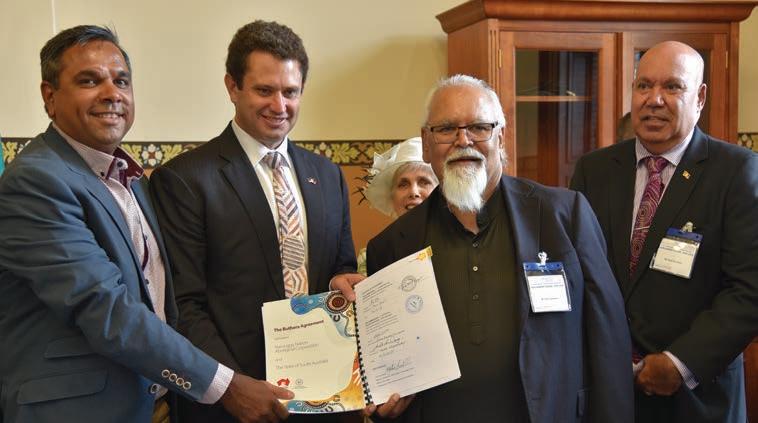
Update on Treaty process
The new Premier and Minister for Aboriginal Affairs, Mr Steven Marshall has told the ABC that his new government will “press the pause button” on the state treaty process. He has asked the Treaty Commissioner Dr Roger Thomas to prepare a report about the lessons learned from the work undertaken by the previous ALP government. He said that negotiations currently underway between the government and the Narungga, Adnyamathanha and Ngarrindjeri people would be put on hold.
“We just don’t have it as a priority for the government…but I don’t want to waste the work that’s already been done by the Commissioner, funded by the taxpayers of South Australia” Mr Marshall told the ABC on Monday 30 April.
Leading Through Collaboration
South Australia’s new Commissioner for Aboriginal Engagement believes that collaboration is the way forward and says he wants to use networks and relationships developed across his long career to influence government for the benefit of Aboriginal people.
Mr Harry Miller (pictured right) has been appointed for a three-year term as South Australia’s Commissioner for Aboriginal Engagement. The Commissioner advises the South Australian Government on systemic barriers to Aboriginal people’s access and full participation in government, non-government and private services.
“I’m not a single voice person. I believe in the fact that unity is a major contribution towards change” Mr Miller told Aboriginal Way recently.
“I don’t see this office working in isolation. People who know me will understand, I’d rather sit in groups and have conversations about change” he said.
Mr Miller is from Port Lincoln and is well known in that community. “My head is in South Australia, my heart is on the West Coast with Aboriginal people, and my soul’s in Port Lincoln where I’ve lived most of my life, worked most of my life and brought my family up in Port Lincoln, along with my wife, Roxanne” he said.
The new Commissioner’s family has moved to Adelaide for the duration of his time in the role.
“With connections to most of the government departments here, and senior bureaucrats, and with politicians, it was obvious that it would be a better move to place myself here in Adelaide for that short period of time” Mr Miller said.
Mr Miller has worked in a wide range of services across his career, he explained to Aboriginal Way. He was most recently Chief Executive Officer at Port Lincoln Aboriginal Health Service but has worked in other sectors.
“I’ve worked across most of the social areas with social security as a starting point. Education, I firmly love my roles in education, starting as an Aboriginal education worker, through to a senior Aboriginal worker, taking on vast areas across the West Coast, and the northern areas.
“Then, I went into the Commonwealth and worked on a number of positions before I left the Commonwealth to become an ATSIC chairperson.
Education is key to personal and community development, according to Mr Miller.
“Education is the foundation of, I think, anybody’s growth. It gives you comradeship, it gives you the fundamental literacy and numeracy. It supports community capacity building and personal pathways leading into tertiary and higher education.
“We have a multitude of academics that have come out of the educational system, and working in high-profile positions, providing evidence-based information to our communities. I think that’s a gracious gift.
He also has an interest in economic development, for individuals and communities, as well as the state as a whole. “I have a vast interest in the economics of the state. And I think it’s time now to …give Aboriginal South Australians the opportunity to create and be part of building their own wealth as individuals, as families, or as communities” Mr Miller said.
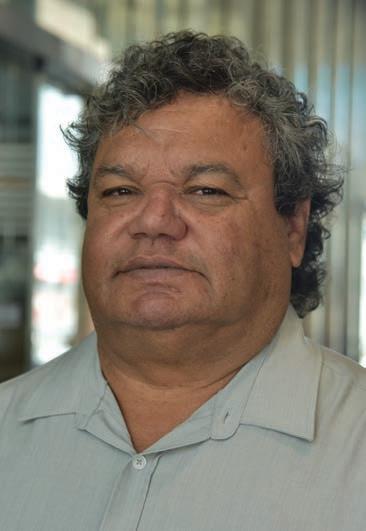
On appointing Mr Miller, the Minister thanked outgoing co-Commissioners, Mr Frank Lampard OAM and Ms Inawantji Scales.



